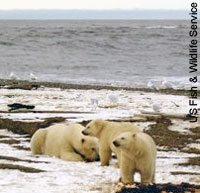
News |
- Sharks Endangered - Need Protection
- CEC Seeks Indigenous Involvement
- New Democratic Party Supports East Side Protection
- Environment - Top Priority for Canadians
- More Risk for Polar Bears
- B.C. Addresses Climate Change
- France Bans 1,500 Pesticides
- Norway's Carbon Neutral Target
- Protection from Bulk Water Removal Needed
- A Greener Budget for 2008
- Canada's Climate Adaptation Report - Delayed
- Mining Protest To End in Jail?
| Sharks Endangered - Need Protection | 27 February 08 |
 Scientists warn that over fishing and finning are depleting the oceans of sharks and have resulted in nine species of shark being added to the World Conservation Union endangered list. Scientists warn that over fishing and finning are depleting the oceans of sharks and have resulted in nine species of shark being added to the World Conservation Union endangered list.With 126 species of shark already on the World Conservation Union (IUCN) list, nine more will be added including the smooth hammerhead, shortfin mako, common thresher, big-eye thresher, silky, tiger, bull, and dusky sharks. "Sharks are definitely at the top of the list for marine fishes that could go extinct in our lifetimes," said Julia Baum of the Scripps Institution of Oceanography in California and a member of IUCN shark specialist group. Shark populations take a long time to mature and can become depleted quickly. Studies show shark populations in the north-west Atlantic Ocean have declined by 50% since the early 1970's and almost 99% along the east cost of the United States. The American Association for the Advancement of Science suggests creating marine reserves around hotspots to provide protection for sharks. View February 18, 2008 The Guardian article View February 18, 2008 BBC News article Visit Shark Alliance website View February 17, 2008 Natural Sciences and Engineering Research Council release View BBC Science and Nature: Animals webpage View WWF - Don't net what you don't need! campaign Sources: The Guardian, BBC News, Shark Alliance, American Association for the Advancement of Science |
|
| CEC Seeks Indigenous Involvement | 27 February 08 |
 Recommendations for greater involvement of indigenous communities in capacity building, alternative energy, and ecotourism projects were sent to the Commission for the Environmental Cooperation (CEC under NAFTA) by its Joint Public Advisory Committee (JPAC). Recommendations for greater involvement of indigenous communities in capacity building, alternative energy, and ecotourism projects were sent to the Commission for the Environmental Cooperation (CEC under NAFTA) by its Joint Public Advisory Committee (JPAC).The CEC Council of federal environment ministers from Canada, United States and Mexico heard recommendations based on two public meetings and a network session held in Winnipeg, Manitoba, September 2007. CEC future projects include eco-regional planning, which clearly involves indigenous people in all three countries. Obtaining and distributing information to remote indigenous communities remains a challenge. Advice included examining opportunities: to maintain indigenous culture; language; traditional environmental knowledge; and values for biological diversity and species at risk protection. The CEC, with support from JPAC, is a sponsor of Convening of Indigenous Peoples for the Healing of Mother Earth March 10-13, 2008 in Mexico. View February 15, 2008 CEC article View September 13, 2007 CEC article View JPAC Advice to Council Re: Engaging Indigenous (PDF) Visit Convening of Indigenous Peoples for the Healing of Mother Earth Website Source: CEC |
|
| New Democratic Party Supports East Side Protection | 22 February 08 |
 During February 2008 the Manitoba New Democratic Party annual convention passed a resolution supporting Manitoba's government in its decision to locate the next BiPole transmission system for the province's hydro system on the west side of the province. During February 2008 the Manitoba New Democratic Party annual convention passed a resolution supporting Manitoba's government in its decision to locate the next BiPole transmission system for the province's hydro system on the west side of the province.The resolution also supports the future boreal World Heritage Site envisioned by First Nations of the region - and keeping the boreal region east and north of Lake Winnipeg intact. "This resolution is another sign that our provincial government means what it says about protecting these boreal lands and waters. Now what we need to see is action to protection lands from development through regulation, as requested by communities in the region. Interim protection will allow communities to get on with lands plans with certainty, " said Gaile Whelan Enns, of Manitoba Wildlands. View February 3, 2008 NDP 2008 Convention Resolution (DOC) Sources: Manitoba NDP, Manitoba Wildlands |
|
| Environment - Top Priority for Canadians | 22 February 08 |
 A new poll confirms climate change is the top concern for Canadians, more than any other issue including war and poverty. The poll, released by Environics, asked Canadians their attitudes and opinions about international issues and what Canada's role should be. A new poll confirms climate change is the top concern for Canadians, more than any other issue including war and poverty. The poll, released by Environics, asked Canadians their attitudes and opinions about international issues and what Canada's role should be.The poll resulted in 29 percent of Canadians identifying the environment as the most pressing problem facing the world today. Yet 23 percent think Canada has missed an important opportunity to make a positive contribution to the world on environmental issues. Over 55 percent of Canadians feel Canada has some influence today in world affairs and two thirds believe Canada's role in the world is stronger than it was 20 years ago. Most are confident that Canada can show leadership on global warming and other environmental issues. The poll sponsored by The Simons Foundation, Environics Institute, CBC/Radio Canada, the Globe and Mail and Le Devoir, is part of a broader national initiative called "Canada's World". View February 4, 2008 CBC article on the findings View February 5, 2008 Globe and Mail article View Canada's World website - Poll results Sources: CBC, Globe and Mail, Igloo |
|
| More Risk for Polar Bears | 20 February 08 |
 The US Fish and Wildlife Service have delayed listing the polar bear as an endangered species, allowing oil and natural gas drilling to begin in the shores off Alaska. The US Fish and Wildlife Service have delayed listing the polar bear as an endangered species, allowing oil and natural gas drilling to begin in the shores off Alaska.Despite legal efforts by Environmental groups 30 million acres of the Chukchi Sea off the coast of Alaska have been auctioned to oil and gas companies for drilling leases. Environmental groups, including the National Audubon Society, Natural Resources Defense Council and Earthjustice, were unable to stop the auction in a federal court. Their claim shows drilling will endanger polar bears, bowhead whales, Pacific walrus, ribbon seals, threatened spectacled eiders, and other marine birds and fish. Record losses of sea ice have occurred and two-thirds of polar bear populations could be gone by 2050 if global climate change continues. Oil and gas exploration in the Chukchi Sea will significantly impact shrinking habitat for polar bears. Over the next five years, the US government has scheduled 8 additional lease sales in the Arctic Ocean, Chukchi and Beaufort seas. The US Department of the Interior received 667 bids for the 5,355 blocks of land up for lease sale in the Chukchi Sea Feb 6, 2008. Shell bid $105.3 million for a single exploration block, the most ever offered for a single tract in a US federal offshore lease sale. View February 4, 2008 PlanetArk article View January 31, 2008 National Audubon Society press release View January 7, 2008 Earthjustice article View February 14, 2008 Reuters article Visit National Audubon Society Source: National Audubon Society |
|
| B.C. Addresses Climate Change | 20 February 08 |
 The British Columbia government announced ambitious environmental initiatives in the Speech from the Throne mid February 2008. The British Columbia government announced ambitious environmental initiatives in the Speech from the Throne mid February 2008. B.C. plans to reduce greenhouse gas emissions by 33 percent from 2007 levels by 2020 and 80 percent bellow 2007 levels by 2050. New legislation that allows the province to participate in regional emissions trading programs with six western U.S. states and Manitoba will be introduced. The throne speech indicates a new climate action plan for BC will be released shortly after the 2008 budget and would be "driven by one simple truth: it is people who cause global warming and it is people who must act to stop it." Highlights:
View February 13, 2008 Vancouver Sun article View February 12, 2008 B.C. Government press release (PDF) View B.C. Speech from the Throne 2008 View February 12, 2008 CBC article View February 12, 2008 Sierra Club BC press release Sources: Government of British Columbia, Globe and Mail |
|
| France Bans 1,500 Pesticides | 20 February 08 |
 France's farm ministry has decided to ban the sale of more than 1,500 pesticides, impacting chemical producers. France's farm ministry has decided to ban the sale of more than 1,500 pesticides, impacting chemical producers.The decision is part of France's environmental strategy to gradually phase out use of 53 phytosanitary products (pesticides) over the next 10 years. Licenses for 30 substances will be ended this year. Three substances are granted a one-year delay for which alternative solutions should be available for in the 2009 crop year. Farmers will have until the end of the year to use remaining stocks of pesticides. Chemical companies including; Dow Chemical, DuPont Co, Bayer, BASF, and Syngenta feel France, the EU's biggest farm state, should act unilaterally with the same standards applied through the rest of the European Union. France feels EU standards are insufficient says pesticides containing the banned substances were "suspected of putting farmer's health at risk". German chemical company BASF calls on France's government to evaluate the impact of the ban on the food industry and the quality of locally grown products in a year's time. View February 4, 2008 PlanetArk article View February 1, 2008 Guerrilla News Network View January 30, 2007 Reuters article Sources: PlanetArk, Reuters, Guerrilla News Network |
|
| Norway's Carbon Neutral Target | 14 February 08 |
 Norway will reduce greenhouse gasses by 30 percent by 2020 and be carbon neutral by 2050, a target set by Norwegian Prime Minister Jens Stoltenberg. Norway will reduce greenhouse gasses by 30 percent by 2020 and be carbon neutral by 2050, a target set by Norwegian Prime Minister Jens Stoltenberg.Norway is ambitiously involved in developing a new climate change agreement to cut emissions. In the short term, Norway will surpass the commitments under the Kyoto Protocol and cut emissions by 10 percent before the first reporting period under Kyoto endsin 2012. "This will require the participation of the countries that produce the highest emissions, including the United States, and major developing countries," said Stoltenberg. "They too will also have to take on concrete emissions commitments." Stoltenberg acknowledges increased awareness and effective international mechanisms for their ability to take on such an ambitious target to reducing greenhouse gases. The plan also includes a higher fuel tax, research in renewable energy, and new forms of mass transport. Norway's carbon emissions rose a disappointing 80 percent from 1990 to 2004. Stoltenberg hopes to turn this trend around, calling for joint action saying, "Clean air, clean seas and ecological balance are some of humankind's most fundamental shared goods. We cannot leave it to market forces and free competition to safeguard them." View January 18, 2008 Treehugger article View December 17, 2007 Aftenpoften article View 2008 Government of Norway carbon release View 2008 Government of Norway climate change release Sources: Treehugger, Government of Norway, Aftenpoften |
|
| Protection from Bulk Water Removal Needed | 14 February 08 |
 A Model Act has been proposed to restrict bulk removal of Canadian water. The Canadian Water Issues Council (CWIC), authors of the paper, are conducting policy research on trans-boundary water issues. A Model Act has been proposed to restrict bulk removal of Canadian water. The Canadian Water Issues Council (CWIC), authors of the paper, are conducting policy research on trans-boundary water issues.A Model Act for Preserving Canada's Waters, prepared in collaboration with Program on Water Issues (POWI) calls for immediate legislation to protect Canadian water basins. Ensuring water resources are sustained for future generations is vital in the face of climate change, pollution, urbanization, and over-consumption. In 2002 the federal government prohibited bulk water removals from boundary water basins. The Model Act fosters sustainable use of all Canada's water resources by providing a minimum national standard and allows provincial governments to create their own legal regimes. A variety of reports suggest federal policy on bulk water removal is inadequate. The discussion for this February 2008 Briefing Paper was hosted by POWI at the Munk Center for International Studies, University of Toronto. View February 6, 2008 webcast of the discussion View 2008 report, A Model Act for Preserving Canada's Waters (PDF) Visit Program on Water Issues website View Protection of the Waters of the Great Lakes (PDF) Sources: University of Toronto, Munk Centre |
|
| A Greener Budget for 2008 | 13 February 08 |
 Canada's Green Budget Coalition highlights key environmental priorities for the 2008 federal budget in Big Steps Forward: Recommendations for Budget 2008. Canada's Green Budget Coalition highlights key environmental priorities for the 2008 federal budget in Big Steps Forward: Recommendations for Budget 2008.Mirroring Canadians' concern for the environment, the Coalition budget recommendations focus on federal government efforts. Jim MacNeill, a leading environmental thinker said, "The budget is the single most important policy statement a government makes about its environment." The Coalition report indicates Canada's economy is suffering from over consumption and inefficient use of non-renewable natural resources. Market prices undervalue the environmental impacts of over-polluting our air, water and soil. The Coalition, comprised of 19 environmental and conservation organizations, formulated three priority recommendations for a better Canada; carbon pricing, action on Nature, and renewing the Great Lakes and St. Lawrence River Region. Other suggestions included in the report are:
View 2008 report, Big Steps Forward: Recommendation for Budget 2008 (PDF) Source: Green Budget Coalition |
|
| Canada's Climate Adaptation Report - Delayed | 13 February 08 |
 Canada's release of a climate change adaptation report has been stalled since fall 2007. The report highlights key issues for each region in Canada and outlines risks and opportunities for climate change adaptation. Canada's release of a climate change adaptation report has been stalled since fall 2007. The report highlights key issues for each region in Canada and outlines risks and opportunities for climate change adaptation.The scientific report from Natural Resources Canada entitled From Impacts to Adaptation: Canada in a Changing Climate 2007 was scheduled to be released prior to the United Nations Climate Change Conference in Bali. Climate Action Network Canada is pressuring Natural Resource Minister Gary Lunn to make the report public. "Could the Minister at least tell Canadians when the report will be released?" asked Graham Saul, Executive Director of CAN-RAC. The report is intended to inform decision-making and policy development about how Canada can adapt to climate change. It describes Canada's vulnerability to global warming and reflects scientific advances in understanding. The report builds on the 2004 report, Climate Change Impacts and Adaptation: a Canadian Perspective and is the final product of the Canadian Climate Impacts and Adaptation Network (C-CIARN), who since their creation in 2001 completed over 130 research projects. The report compliments the Fourth Assessment Report of the Intergovernmental Panel on Climate Change and the Arctic Climate Impacts Assessment. View January 23, 2008 Climate Action Network Canada release View Natural Resources Canada - Climate Change Impacts and Adaptation Program View Climate Change Impacts and Adaptation: a Canadian Perspective (PDF) View Intergovernmental Panel on Climate Change Fourth Assessment Report - Climate Change 2007: Synthesis Report Visit Arctic Climate Impacts Assessment Sources: Climate Action Network, Natural Resources Canada |
|
| Mining Protest To End in Jail? | 08 February 08 |
 Members of a remote First Nation community in Ontario's Boreal Forest may face jail time for contempt of court charges over ongoing mining exploration disputes. Members of a remote First Nation community in Ontario's Boreal Forest may face jail time for contempt of court charges over ongoing mining exploration disputes.Chief Donnie Morris and other members of Kitchenuhmaykoosib Inninuwug (KI) have refused to comply with an October 25, 2007 ruling allowing Platinex Inc, a junior mining exploration company, access to land near Big Trout Lake. "This conflict could have been prevented if Ontario had taken a respectful "Conservation First" approach and implemented comprehensive land use planning before development in the Boreal Forest. An immediate cessation of staking is needed to allow the conflict to be resolved peacefully," said Anna Baggio, CPAWS Wildlands League. Laws promoting mineral exploration are outdated and up against modern appreciation of conservation values and First Nation rights and title. "Platinex seeks to jail our leaders and supporters and bankrupt our community," Chief Donnie Morris said. "I'm prepared to go to jail for my belief in my land." Justice Smith stated he would not deliver a sentence as of yet and a final hearing court date is expected to be set at the beginning of April. View January 24, 2008 Wawatay News article View January 25, 2008 The Chronicle Journal article View January 28, 2008 Mining Watch Canada article View January 25, 2008 CNW article Visit Kitchenuhmaykoosib Inninuwug website Visit Platinex website Sources: Wawatay News, The Chronicle Journal, Mining Watch Canada, CNW |
|


 RSS Feeds:
RSS Feeds: